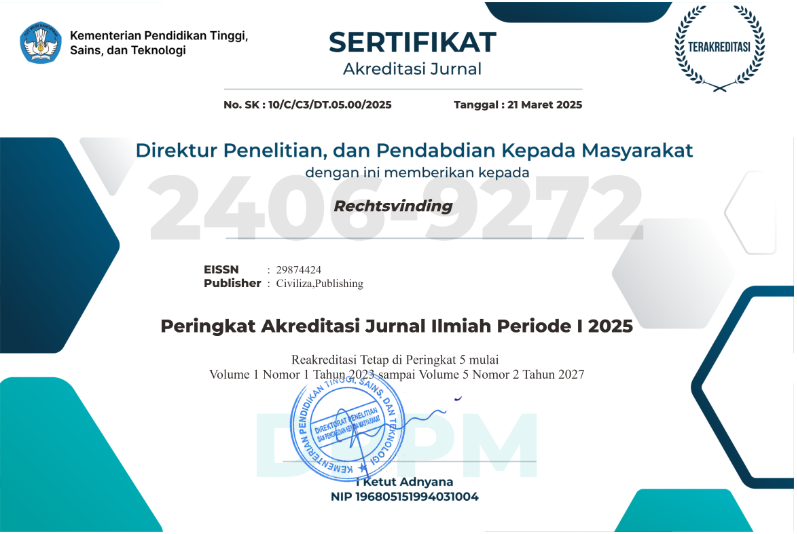Development of Productive Waqf in Candimulyo Village from an Islamic Law Perspective
DOI:
https://doi.org/10.59525/rechtsvinding.v2i2.419Keywords:
Productive Waqf; Potential; Development; Islamic LawAbstract
Istismari waqf is also commonly called productive waqf, which is a waqf of property used for investment purposes, either in agriculture, industry, trade, and services. The benefits of productive waqf are not obtained from the waqf object directly, but from the profits or results of waqf management. The word productive is an adjective derived from the word product which means results, work results, goods or objects that are produced. Based on this meaning, the word productive means something that has yield power or has the ability to produce (in large quantities). The formulation of the problem in this study is how is the strategy for developing productive rice field waqf in Candimulyo Village? And how is the development of productive rice field waqf in Candimulyo Village from an Islamic law perspective. This study aims to describe the strategy for developing productive rice field waqf in Candimulyo Village and to analyze the development of productive rice field waqf in Canimulyo Village from an Islamic law perspective. The research method used is field study with a qualitative approach. Data collection was carried out through interviews, observations, and documentation. Data analysis using descriptive-analytical methods. The results of the study show that: (1) The potential for productive waqf in Candimulyo Village is quite large, both in terms of land area, agricultural commodities, and the number of nazhirs. However, the management of productive waqf in this village is still not optimal. (2) From an Islamic legal perspective, the development of productive waqf in Candimulyo Village can be carried out through professional management, development of various types of productive businesses, and empowerment of the surrounding community. This is in line with the objectives of waqf in Islam, namely for the public interest and welfare of the community.
References
Adelia, Nisa. Pengelolaan Wakaf Produktif Dalam Perspektif Hukum Positif Dan Hukum Ekonomi Syariah. Skripsi (Lampung: Unisversitas Islam Negeri Raden Intan).
Adiana, Elisa Yesli. Analisis Pengelolaan dan Pengembangan Wakaf Produktif Yayasan Pondok Pesantren Nurul Iman Silau Dunia. Skripsi (Medan: Universitas Muhammadiyah Sumatera Utara).
Al-Jauziyyah, Ibn Qayyim. I’lam al-Muwaqqi’in ‘an Rabb al’’Alamin. (Kairo: Dar al-Hadith, 2006).
Djunaidi, Achmad, Al-Asyhar Thobieb. Menuju Era Wakaf Produktif. (Jakarta : Mitra Abadi Press, 2006).
Fikih Wakaf. Direktorat Pemberdayaan Wakaf dan Direktorat Jendral Bimbingan Masyarakat Islam dan Departemen RI (eds). 16.
Mughniya, Muhammad Jawab. Fiqih Lima Mahzab. (Jakarta: PT Lentera Basritama, 2000).
Muzarie, Mukhlisin. Hukum Perwakafan Dan Implementasinya Terhadap Kesejahteraan Masyarkat. cet. Pertama. (Jakarta: Kementrian Agama RI, 2010).
Nawawi, Muhammad. Potensi Wakaf Produktif Menurut Perspektif Ekonomi Islam. Skripsi (Medan: Universitas Islam Negeri Sumatera Utara).
Noor, Juliansyah. Metodologi Penelitian. (Jakarta: Kencana Prenada Media Group, 2011).
Ramadhan, Taufiq. Pengelolaan Wakaf Produktif Dalam Mewujudkan Kesejahteraan Masyarakat Di Kota Banda Aceh. Skripsi (Jakarta: Institut Ilmu Al-Quran).
Rozalinda. Manajemen Wakaf Produktif. (Jakarta: Raja Grafindo Persada, 2015).
Sabiq, Sayyid. Fiqhu as-sunnah. (Lebanon : Dar al-“araby, 1971).
Sugiyono. Metode Penelitian Kuantitatif, Kualitatif, dan R&D. (Bandung: Alfabeta, 2013).
Suhairi. Wakaf produktif. (Yogyakarta: Kaukaba, 2014).
Ulfah, Mutia. Analisis Manajemen Pengelolaan Wakaf Produktif Dalam Meningkatkan Kemanfaatan Harta Wakaf. Skripsi (Lampung: Univeritas Islam Negeri Raden Intan Lampung).
Usman, Rachmadi. Hukum Perwakafan di Indonesia. (Jakarta: Sinar Grafika, 2013).
Yusuf, Muhammad. Pemberdayaan Wakaf Produktif Untuk Pemberdayaan Ekonomi Umat. (Semarang: Badan Wakaf Nusantara, 2009).
Zulkifli. Wakaf Tunai dan Produktif Perspektif Hukum Ekonomi Islam
Downloads
Published
How to Cite
Issue
Section
License
Copyright (c) 2024 Moh. Rokhani, Ahmad Syafi'i, Diyan Putri Putri

This work is licensed under a Creative Commons Attribution 4.0 International License.








